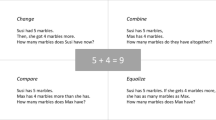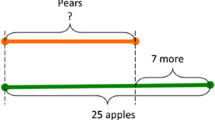Abstract
The issue of how teaching strategies inform students’ approaches to solving word problems has been, and still remains, the focus of attention in mathematics education. In this book chapter, we outline a rationale for the Equilibrated Development Approach (EDA) to word problem solving and provide its principles and epistemological stance. The EDA is informed by and critically engages with the tenets of sociocultural theory, the Vygotskian paradigm for learning, and Davydov’s and Galperin’s theoretical and empirical work (Vygotsky LS, Educational psychology. St. Lucie Press, Boca Raton, 1997; Davydov VV, Problems of developmental instruction: a theoretical and experimental psychological study. Nova Science Publishers, Hauppauge, 2008; Galperin P, Georgiev L, The formation of elementary mathematical notions. Soviet Stud Psychol Learn Teach Math 1:189–216, 1969). For a decade now, we have used the EDA to construct, refine, and gradually implement new ways of teaching problem solving. We share examples of original teaching-learning activities fostering students’ mathematical thinking and sense making in solving word problems. We also share examples from our classroom observations to suggest alternative teaching strategies in elementary mathematics. The purpose of our work is to surface processes of understanding quantitative relationships and to shed light on the role they play in one’s capacity-building in solving word problems. In this chapter, we discuss our work within the intersection point of mathematics education, educational psychology, learning theories, and studies in neuro-education to demonstrate how the EDA approach coalesces insights garnered from these diverse study areas to constitute an innovative way of teaching word-problem solving in elementary school.
Access this chapter
Tax calculation will be finalised at checkout
Purchases are for personal use only
Similar content being viewed by others
Notes
- 1.
See Polotskaia and Savard (2018) for quantitative and qualitative analyses of evidence from the experimental and control groups.
References
Bednarz, N. (2009). Chapitre 2. Interactions sociales et construction d’un système d’écriture des nombres en classe primaire. Après Vygotski et Piaget, 57–72. https://doi.org/10.3917/dbu.garni.2009.01.0057
Biron, D., Rajotte, T., Marinova, K., Drainville, R., & Louis, C. (2016). Mathématiques ludiques pour les enfants de 4 à 8 ans. Presses de l'Université du Québec.
Blanton, M. L., Stephens, A. A., Knuth, E. J., Gardiner, A. M., Isler, I., Kim, J. S., Jee-Seon, K., Kim, J. S., & Jee-Seon, K. (2015). The development of children’s algebrai thinking: The impact of a comprehensive early algebra intervention in third grade. Journal for Research in Mathematics Education, 46(1), 39–87. https://doi.org/10.5951/jresematheduc.46.1.0039
Cai, J., Lew, H. C., Morris, A., Moyer, J. C., Fong Ng, S., & Schmittau, J. (2005). The development of studients’ algebraic thinking in earlier grades. Zentralblatt Für Didaktik Der Mathematik, 37(1), 5–15. https://doi.org/10.1007/bf02655892
Carpenter, T. P., Fennema, E., Franke, M. L., Levi, L., & Empson, S. B. (1999). Children’s mathematics: Cognitively guided instruction. Heinemann.
Cavalcante, A., Polotskaia, E., Savard, A., & Fellus, O. (2019). Teacher noticing of student thinking: An analysis of a teacher’s interpretation of mathematics problem solving. In Bulletin of the Transilvania University of Brasov. Series VII: Social sciences and law (Vol. 12, pp. 1–9). University of Brsov.
Davydov, V. V. (1982). Psychological characteristics of the formation of elementary mathematical operations in children. In T. P. Carpenter, J. M. Moser, & T. A. Romberg (Eds.), Addition and subtraction: A cognitive perspective (pp. 224–238). Lawrence Erlbaum Associates.
Davydov, V. V. (2008). Problems of developmental instruction: A theoretical and experimental psychological study. Nova Science Publishers.
Davydov, V. V., & Mikulina, G. G. (1988). Psychologo-pedagogicheskoye obosnovaniye postroyeniya experimental’nogo kursa matematiki dlya nachal’noy shkoly I resultaty yego approbatsii. In: Davydov, V. V. (Ed.), Psychologo-pedagogicheskiye osnovy postroyeniya novogo uchebnogo predmeta Matematika dlya nachal’no’ shkoly. Chast’ 1, Academiya pedagogicheskikh nauk. [Psychological- pedagogical foundations of experimental mathematics course for primary school and results of its implementation. In V. Davydov (Ed.), Psychological- pedagogical base for elaboration of new school subject Mathematics for primary school. ] (Vol. 1, pp. 154–174). Academy of Pedagogical Sciences of U.S.S.R.
Ducharme, M., & Polotskaia, E. (2010). Two scenarios for problem solving and pro-algebraic reasoning development in primary school children. Journal of Educational Science & Psychology, 62(1B), 170–184.
Freiman, V., Polotskaia, E., & Savard, A. (2017). Using a computer-based learning task to promote work on mathematical relationships in the context of word problems in early grades. ZDM Mathematics Education, 49(6), 835–849. https://doi.org/10.1007/s11858-017-0883-3
Galperin, P., & Georgiev, L. (1969). The formation of elementary mathematical notions. Soviet Studies in the Psychology of Learning and Teaching Mathematics, 1, 189–216.
Gjære, Å. L., & Blank, N. (2019). Teaching mathematics developmentally: Experiences from Norway. For the Learning of Mathematics, 39(3), 28–33.
Greer, B. (1992). Multiplication and division as models of situations. In D. A. Grouws (Ed.), Handbook of research on mathematics teaching and learning (pp. 276–295). NCTM.
Hegarty, M., Mayer, R. E., & Monk, C. A. (1995). Comprehension of arithmetic word problems: A comparison of successful and unsuccessful problem solvers. Journal of Educational Psychology, 87(1), 18–32. https://doi.org/10.1037/0022-0663.87.1.18
Iannece, D., Mellone, M., & Tortora, R. (2009). Counting vs. measuring: Reflections on number roots between epistemology and neuroscience. In M. Tzekaki & M. Kaldrimidou (Eds.), Proceedings of the 33rd conference of the international group for the psychology of mathematics education (Vol. 3, pp. 209–216). PME.
Kieran, C. (Ed.). (2018). Teaching and learning algebraic thinking with 5- to 12-year-olds. Springer.
Lesh, R., & Zawojewski, J. (2007). Problem solving and modeling. In F. K. J. Lester (Ed.), Second handbook of research on mathematics teaching and learning (Vol. 1, pp. 763–787) IAP. http://books.google.com/books?hl=en&lr=&id=Cww16Egbp4oC&pgis=1
Lins, R., & Kaput, J. J. (2004). The early development of algebraic reasoning: The current state of the field. In K. Stacey, H. Chick, & K. Margaret (Eds.), The future of the teaching and learning of algebra the 12 th ICMI study (pp. 45–70). Springer. https://doi.org/10.1007/1-4020-8131-6_4
Malara, N. A., & Navarra, G. (2018). New words and concepts for early algebra teaching: Sharing with teachers epistemological issues in early algebra to develop students’ early algebraic thinking. In C. Kieran (Ed.), Teaching and learning algebraic thinking with 5- to 12-year-olds (pp. 51–77). ICME-13 Mo. https://doi.org/10.1007/978-3-319-68351-5_3
Mukhopadhyay, S., & Greer, B. (2001). Modeling with purpose: Mathematics as a critical tool. In B. Atweh, H. Forgasz, & B. Nebres (Eds.), Sociocultural research on mathematics education: An international perspective (pp. 295–311). Lawrence Erlbaum Associates.
Nesher, P., Greeno, J. G., & Riley, M. S. (1982). The development of semantic categories for addition and subtraction. Educational Studies in Mathematics, 13, 373–394. 0013-1954/82/0134-03735.
Ng, S. F., & Lee, K. (2009). The model method: Singapore children’s tool for representing and solving algebraic word problems. Journal for Research in Mathematics Education, 40(3), 282–313.
Okamoto, Y. (1996). Modeling children’s understanding of quantitative relations in texts: A developmental perspective. Cognition and Instruction, 14(4), 409–440. https://doi.org/10.1207/s1532690xci1404_1
Pape, S. J. (2003). Compare word problems: Consistency hypothesis revisited. Contemporary Educational Psychology, 28(3), 396–421.
Pape, S. J. (2004). Middle school children’s problem-solving behavior: A cognitive analysis from a reading comprehension perspective. Journal for Research in Mathematics Education, 35(3), 187.
Piaget, J. (1964). PART I: Cognitive development in children: Piaget: Development and learning. Journal of Research in Science Teaching, 2(3), 176–186. https://doi.org/10.1002/tea.3660020306
Polotskaia, E. (2014). Problems involving additive relationships. Accessed 2021, October 26, 2021 from: https://elenapolotskaia.com/mathematical-reasoning-development-games/categories/
Polotskaia, E. (2015). How elementary students learn to mathematically analyze word problems: The case of addition and subtraction [McGill University]. Ph. D. thesis. http://mcgill.worldcat.org/title/how-elementary-students-learn-to-mathematically-analyze-word-problems-the-case-of-addition-and-subtraction/oclc/908962593&referer=brief_results
Polotskaia, E., & Savard, A. (2018). Using the relational paradigm: Effects on pupils’ reasoning in solving additive word problems. Research in Mathematics Education, 20(1), 70–90. https://doi.org/10.1080/14794802.2018.1442740
Polotskaia, E., & Savard, A. (2021). Some multiplicative structures in elementary education: A view from relational paradigm. Educational Studies in Mathematics, 106, 447–469. https://doi.org/10.1007/s10649-020-09979-8
Polotskaia, E., Gélinas, M.-S., Gervais, C., & Savard, A. (2023). Représenter pour mieux raisonner. Résolution de problèmes écrits de multiplication et de division. JFD Éditions.
Riley, M. S., Greeno, J. G., & Heller, J. L. (1984). Development of children’s problem-solving ability in arithmetic. In H. P. Ginsburg (Ed.), The development of mathematical thinking (pp. 153–196). Academic Press Inc. http://www.eric.ed.gov/ERICWebPortal/search/detailmini.jsp?_nfpb=true&_&ERICExtSearch_SearchValue_0=ED252410&ERICExtSearch_SearchType_0=no&accno=ED252410
Robertson, S. I. (2017). Problem solving. Perspectives from cognition and neuroscience. Routledge, Taylor & Francis Group.
Savard, A. (2008). Le développement d’une pensée critique envers les jeux de hasard et d’argent par l’enseignement des probabilités à l’école primaire: Vers une prise de décision. Université Laval.
Savard, A., & Polotskaia, E. (2017). Who’s wrong? Tasks fostering understanding of mathematical relationships in word problems in elementary students. ZDM Mathematics Education, 49(6), 823–833. https://doi.org/10.1007/s11858-017-0865-5
Savard, A., Cavalcante, A., & Polotskaia, E. (2018). Changing paradigms in problem solving: An example of a professional development with elementary school teachers. In E. Bergqvist, M. Österholm, C. Granberg, & L. Sumpter (Eds.), Proceedings of the 42nd conference of the international group for the psychology of mathematics education (Vol. 5, p. 288). PME.
Schwartz, J. L. (1996). Semantic aspects of quantity. Unpublished manuscript. Education, January, 1–73. http://citeseerx.ist.psu.edu/viewdoc/download?doi=10.1.1.622.7161&rep=rep1&type=pdf
Sophian, C. (2007). The origins of mathematical knowledge in children. Lawrence Erlbaum Associates.
Stavy, R., & Babai, R. (2010). Overcoming intuitive interference in mathematics: Insights from behavioral, brain imaging and intervention studies. ZDM Mathematics Education, 42(6), 621–633.
Stein, M. K., Engle, R. A., Smith, M. S., & Hugues, E. K. (2008). Orchestrating productive mathematical discussion: Five practices for hel** teachers move beyond show and tell. Mathematical Thinking and Learning, 10(4), 313–340.
Vygotsky, L. S. (1997). Educational psychology. St. Lucie Press.
Wagner, S., Mitchell, Z., & Goldin-Meadow, S. (2008). Gesturing makes learning last. Gesture, 106, 1047–1058. https://doi.org/10.1016/j.cognition.2007.04.010
**n, Y. P., Zhang, D., Park, J. Y., Tom, K., Whipple, A., & Si, L. (2011). A comparison of two mathematics problem-solving strategies: Facilitate algebra-readiness. The Journal of Educational Research, 104(6), 381–395. https://doi.org/10.1080/00220671.2010.487080
Funding
The research projects discussed in this chapter were funded by the Quebec ministry of éducation (“Chantier 7” funding opportunity 2012 and 2015).
Author information
Authors and Affiliations
Corresponding author
Editor information
Editors and Affiliations
Rights and permissions
Copyright information
© 2023 The Author(s), under exclusive license to Springer Nature Switzerland AG
About this chapter
Cite this chapter
Polotskaia, E., Savard, A., Fellus, O., Freiman, V. (2023). Equilibrated Development Approach to Word Problem Solving in Elementary Grades: Fostering Relational Thinking. In: Robinson, K.M., Kotsopoulos, D., Dubé, A.K. (eds) Mathematical Teaching and Learning. Springer, Cham. https://doi.org/10.1007/978-3-031-31848-1_3
Download citation
DOI: https://doi.org/10.1007/978-3-031-31848-1_3
Published:
Publisher Name: Springer, Cham
Print ISBN: 978-3-031-31847-4
Online ISBN: 978-3-031-31848-1
eBook Packages: EducationEducation (R0)




